Should city of Boise take a public stance on abortion? McLean, Masterson face off
- Oops!Something went wrong.Please try again later.
Candidates for Boise mayor faced off in a debate, trading their views on city issues such as housing, homelessness, policing and sustainability.
The audience in a packed room at the Grove Hotel listened attentively over lunch to answers from the four candidates, who largely stuck to their views on the topics of the day.
Mayor Lauren McLean touted things her administration had done on public-private partnerships to build designated affordable housing, set carbon-neutrality goals and rewrite a decades-old zoning code to coordinate denser, transit-focused development.
McLean sustained criticism on her management of the police department, the streamlining of development the zoning code rewrite allows, and her use of public money to finance low-income housing.
The mayor’s opponents include Mike Masterson, a former Boise police chief, Joseph Evans and Aaron Reis. Neither Reis nor Evans has recorded campaign fundraising, but both qualified for the ballot, so the debate’s organizers invited them to participate.
Reis has previously lived in Hawaii and Switzerland and told the Statesman he was deported for attempting to report on Ukraine. Evans is a veteran who studied at Boise State University and previously ran for Congress.
Masterson had pulled in $180,000 as of August, according to his campaign-finance disclosures. McLean had raised $458,000 as of September.
Below are highlights of Thursday’s forum, edited for length and clarity. The debate was hosted by the City Club of Boise and the League of Women Voters. It was moderated by McKay Cunningham, an administrator at The College of Idaho.
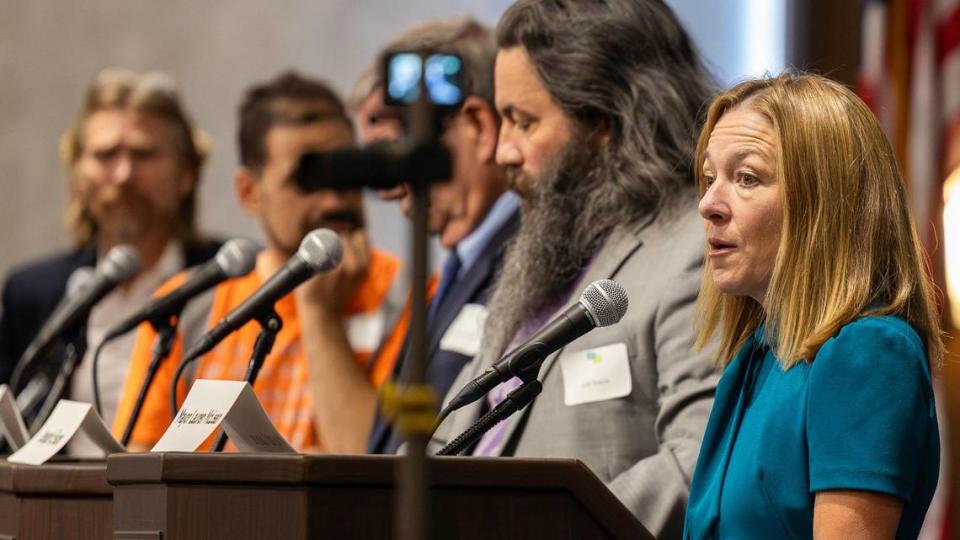
Opening statements
Reis: It is no measure of health to be well-adjusted to a profoundly sick society. The label of mental illness can really affect someone. An economy based on suffering where the basic human needs are withheld from the proletariat in exchange for the exploitation of our labor, there is really no wrong reason to want to contemplate the existential dread that we all feel.
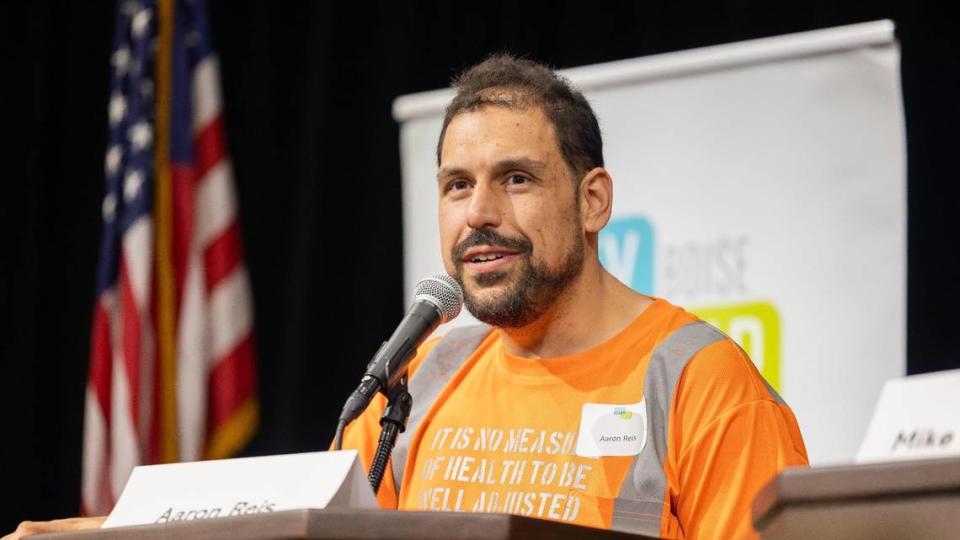
Evans: My peer Aaron brings up a lot of good issues with regards to bodily autonomy and self-determination. With growth comes displacement and other issues related to housing, homelessness, as well as concerns about the education of our children, the safety of our children. Where Boise leads, the Treasure Valley follows, and the rest of Idaho is not far behind.
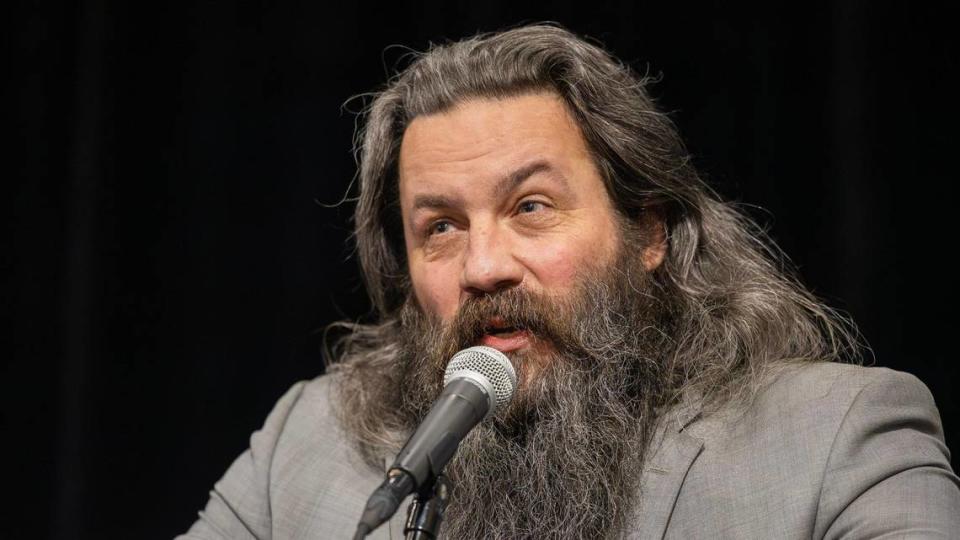
McLean: Seven years ago, the League of Women Voters helped pass a bond that made the Lander Street Water Renewal Facility possible. That’s actually a great example of how all of us as a community come together to create the city that we love.
It’s been a true honor to be knocking on doors with babies on my hips, organizing with so many of you to protect our Foothills, serving on the parks board then council, and now for the last four years as mayor of the city that I love deeply. It’s been an incredibly challenging four years. I’ve learned so much and take all those learnings with me moving forward. We’ve rolled up our sleeves together to address our community’s most pressing challenges: affordable housing, protecting our parks and open space forever, addressing and preparing for climate and keeping the city the safe city that she is.
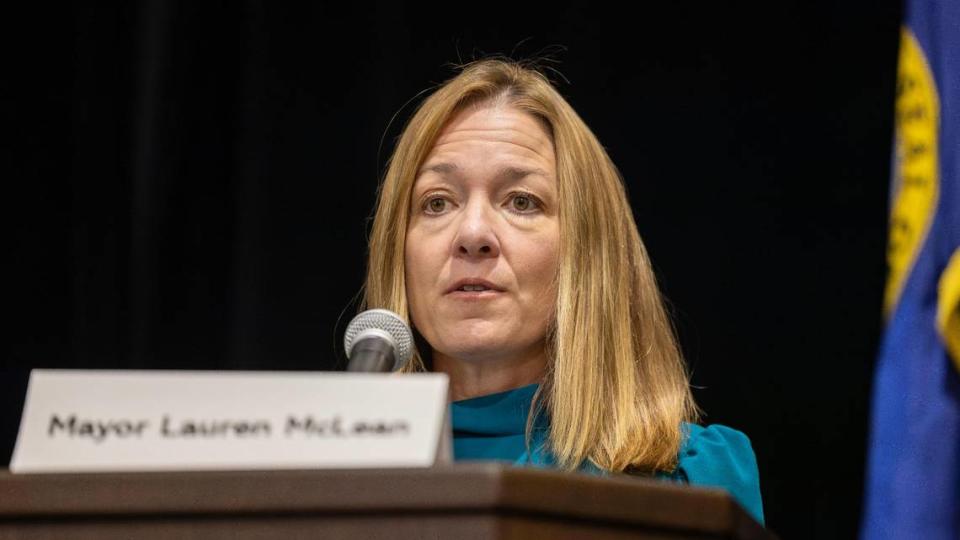
Masterson: I’ve dedicated 50 years of my life to public service, 40 years as a police officer, and then the final 10 years as Boise police chief. I took a department embroiled in controversy and turned it into a nationally recognized agency. I retired believing my service had Boise headed in the right direction. The last three years have proven me wrong.
We are at a critical juncture in determining our future. I believe we’re taking the path to becoming a clone of other troubled cities. We need to get the basics right again. We need leadership that unites the community instead of dividing us. We need fewer crises, controversies and lawsuits. We need to restore transparency and openness with government and above all a willingness to listen to our citizens instead of ignoring their voices.
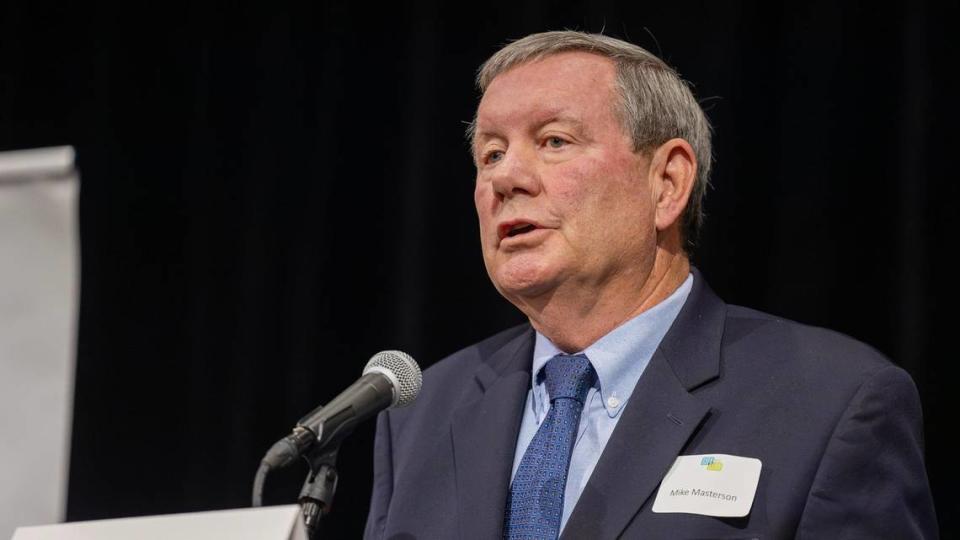
Q&A
What’s the most pressing, the most urgent issue that’s facing our city today and what can the mayor’s office do to address that issue?
Masterson: I think the most urgent issue is public safety. It’s the reason why cities were organized in the first place. The first responders need the respect and encouragement of our mayor, and I think that we have seen the Police Department demoralized over the last few years.
We hired the wrong police chief, handpicked by this mayor. We saw resulting controversy. We have seen a tremendous amount of turmoil. We still have a hiring crisis of 30 officers or more. We need to fill those positions.
McLean: It’s a safe city where crime is down and has been down every year in the last three years.
Folks are concerned about having a place that they can afford to live in. We took an all-hands-on-deck approach to housing, and we built momentum and yes, there’s so much more to do. We went deep into a land trust, and next week we’re going to celebrate the opening of 300 homes at Franklin and Orchard. We’ve changed ordinances and created incentives because we’ve got to have public-private partnerships and solutions to address housing.
We’ve also got to make sure it’s safe, which is why we’ve invested in public safety; it’s why we’ve grown the department by 34 positions in three years. It’s why we’ve invested in justice and accountability.
Evans: I pretty much agree with the mayor on this. One of the biggest issues we have is housing affordability. With the recent changes in the upzone, we’re looking at displacement. A lot of things associated with the upzone, such as multi-use facilities, are going to requires upgrades in the infrastructure.
Reis: I think the most pressing issue facing anyone is mental illness. I feel like the public’s pretty safe here. Having a Police Department that’s shot more people this year than any year since 2000, that doesn’t make me feel super safe. I think the government should fear its people, not the other way around. Making more houses is going to make more of a market for moneyed interests to come in here and tear up the very neighborhoods that people are actually coming here for.
—
As rents and home prices in Boise continue to outpace wages, what are three concrete steps that the mayor’s office can pursue to address housing affordability?
Evans: Walkability, being able to establish commercial outlets in close proximity to housing so that we can continue to work where we live. The potential addition of annexed areas, particularly in those areas that are currently uncontested.
McLean: It’s been a priority of ours to make sure that everybody that lives and works in Boise is able to afford a home in Boise. We’ve got to prevent evictions. You build partnerships to ensure that housing at all price points is possible by putting our city land out to the best ideas possible. By looking at a modern zoning code that replaces outdated exclusionary 1960s code, we’ve created a map along transit corridors where the market will respond and build homes.
Reis: Wages, wages, wages. Despite what the current mayor thinks, markets are actually cruel and soulless. You’d have to work with legislators to make it even available to change the code so that you can even start to address wages.
Masterson: We’ve pushed our housing problems to our neighborhoods to the west by not building more housing here. I have some ideas that we can use some low-grade agricultural land in Southeast Boise to create those smart planned communities like we did in Harris Ranch. We have to stop using our taxpayer money in terms of supporting our housing initiatives here for low- and moderate-income housing. We have a very charitable community, we can form alliances for land trusts. Finally upzoning: We needed to codify our zoning laws, it’s been neglected, but we have robbed the voices of the people in our neighborhoods from some decisions.
—
We’re seeing air quality days, increasing drought frequency, hotter summer days, earlier snowmelt. Can the city do anything about these environmental impacts? Is that the city’s job?
McLean: If we all said we can’t do it, then who’s going to do it? This isn’t about stopping climate change but about preparing our city for the future of resiliency. We’re doing simple things to make sure that our neighborhoods can be cooler by doubling our tree canopy. We’ve set goals around clean electricity and carbon neutrality, because when we have a clean power source, we will save our residents money. We’re electrifying buildings with federal dollars.
Reis: The Industrial Revolution and its consequences have been devastating for the human race. This isn’t my particular issue.
Masterson: Climate change is real. When this community wanted to build a $30 million police facility downtown, we took a long-abandoned facility out off of Emerald for half that price, converted it to a police station, and I insisted on a silver LEED certification. We all need to do our part when it comes to climate change.
Evans: Is climate change real? Yes. Is it man-made? If it is, we can reverse it. If it isn’t, we can prepare for it. We have geothermal, we have solar, we continue to enjoy the benefits of hydropower. We don’t need coal plants in Utah and Wyoming.
—
Mr. Masterson, you’ve based much of your campaign on your former service as Boise chief of police, but the mayor does much more than work with the police. What qualifies you beyond your chief of police experience?
As police chief I worked very closely with the executive team. I saw many community problems that weren’t safety related. I worked with the Parks Department to abate graffiti. I commit that I can work with transportation issues; I’ve worked with ACHD and with Compass. I will continue to work with housing with those department heads, but I will empower them, because I’m not a person that has all those answers, and I will have a staff that will do it.
—
Mayor McLean, the police and fire unions have endorsed Mr. Masterson. There was some controversy over the hiring and firing of the Chief of Police Lee. Would you have handled anything differently to gain the endorsement of the police and fire unions?
McLean: I’ve learned a lot in the last four years. Union endorsements are union endorsements. I didn’t have those endorsements last time around, but it didn’t impact the way we negotiated, the way we’ve invested in fire stations, and the way we added raises — 12% — for the next two years for fire and some of the biggest raises the Police Department has seen because our employees are important.
On the police chief, I’ve learned a lot on that one. We had a process that started before I was elected. There were four community panels. They delivered me three finalists, two both tied for the top. I chose one and that was Ryan Lee. It didn’t work out.
—
Mr. Evans, how should public resources be used to ensure safety in our community without government overreach?
Evans: We need people who are part of the community policing the community.
Reis: Restorative justice. Every time a police officer mishandles what they treat like a toy, they should all be disarmed.
—
What is your campaign’s policy toward negative ad campaigns? Will your campaign disavow or discourage political action committees who may be campaigning on your behalf if they do so in a negative way?
Evans: Being an underdog candidate, the PACs really haven’t lined up behind me. I definitely am not for attack ads.
Reis: Tearing each other down is not going to work.
Masterson: I’m proud of my bipartisan coalition that I’ve built. I was distressed by some of the divisive ads that we had seen last week and had nothing to do with it. We don’t have to be divisive, we don’t have to be finger-pointing. I don’t want to see that.
McLean: I’ve been really clear with my campaign that we’re going to stay focused on the future. If there were a PAC out there that went negative on my behalf — I’ll say in advance, please do not. It’s not the campaign I ran four years ago. It’s not the campaign I’m running this year.
—
We received a lot of questions about the zoning rewrite. Do you think that the rewrite was necessary? If so, was it approached correctly?
Masterson: Absolutely it was necessary. I believe the process was flawed. I think we could have spent more time; it’s an important decision to get right. It’s not going to impact the entire city. It’s our eight to 10 most affordable neighborhoods that are impacted the most, and I would like to sit down and talk with them on how we see compromise.
Evans: The rewrite was absolutely necessary. The upzone affected the most affordable housing in the city mainly up on the Bench. We have yet to see what the final fallout with regards to that displacement is going to be.
McLean: I’m really proud of the citizens committee that was over 30 people with really diverse viewpoints, the thousands of people that they sat down with in school libraries and cafeterias and other places. And then the council that took so much of that into account and made changes reflective of feedback. What this does, it actually puts more people-scale density along transit corridors. We all say we want transit. We need homes to support that.
Reis: Less is more.
—
What is the best practice on working with the state Legislature, sometimes pushing back against the state Legislature, particularly as it relates to women’s reproductive rights?
Masterson: I think it’s a mistake to use the mayor’s office to publicize issues that are within the purview of our state and national governments. We don’t have the authority to change those here. I think it leaves us divided. I hope we can all agree that women are not safe when politics becomes involved in medicine.
McLean: Best practice is you work with all agencies wherever you can, but you don’t move on your city values. When we have a state that says they will criminalize our doctors, criminalize our daughters, maybe even us if we have problems with our pregnancy, I’m going to be clear that there is a place for everyone here and we will not prioritize resources to help with those investigations.
Evans: With regard to legislation in Idaho, a lot of it’s morality code that criminalizes nonviolent behavior. They do not benefit the community at large.
Reis: Everyone needs their bodily autonomy and medical privacy.
—
Listen to the entire debate on Boise State Public Radio.

